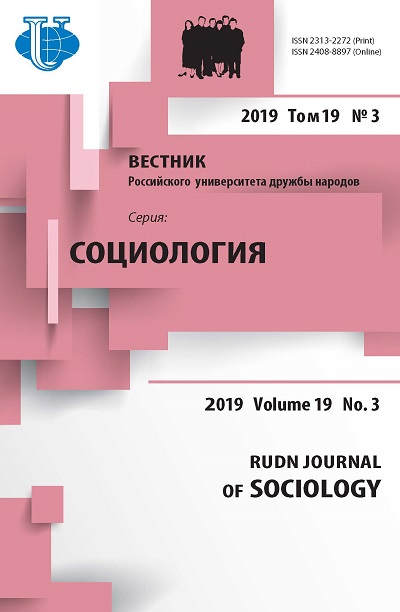Нестандартный труд: кто в выигрыше? Теоретико-методологический анализ подходов к изучению нестандартной трудовой занятости
- Авторы: Анисимов Р.И.1
-
Учреждения:
- Российский государственный гуманитарный университет
- Выпуск: Том 19, № 3 (2019)
- Страницы: 543-552
- Раздел: Социологический лекторий
- URL: https://journals.rudn.ru/sociology/article/view/21687
- DOI: https://doi.org/10.22363/2313-2272-2019-19-3-543-552
- ID: 21687
Цитировать
Полный текст
Аннотация
В статье рассмотрены основные подходы к изучению нестандартной трудовых отношений. Основываясь на концептуальной модели, предложенной К. Раковски, проанализировано три подхода: структуралистский, неомарксистский и легалистский; выявлены их методологические ограничения и эвристический потенциал. Основываясь на статистических и социологических данных, показано широкое распространение нестандартных трудовых отношений в России (32-59 млн человек). Автор приводит диаметрально противоположные оценки этого явления: одни концепции сосредоточены на преимуществах, другие - на недостатках нестандартных трудовых отношений. Как правило, эти оценки зависят от идеологических позиций авторов и предмета анализа. В статье показана методологическая путаница в анализе нестандартных трудовых отношений в легалистском подходе, получившем сегодня широкое распространение: в нем происходит отождествление неформального сектора экономики и нестандартной трудовой занятости, что затрудняет анализ бенефициаров и «жертв». Преимуществами нестандартных трудовых отношений пользуются лица, занимающиеся предпринимательской деятельностью, страдают от них наемные работники. В статье предложено разграничить наемных работников с нестандартными трудовыми отношениями и предпринимателей в неформальном секторе экономики, что позволило объединить концепции нестандартных трудовых отношений и выявить выигрывающие и проигрывающие в них группы. Проанализированы причины роста нестандартной занятости: глобализация, автоматизация, изменение ценностей труда, социальная политика - в контексте эволюции капитализма как исторической системы.
Об авторах
Роман Иванович Анисимов
Российский государственный гуманитарный университет
Автор, ответственный за переписку.
Email: ranisimov@list.ru
кандидат социологических наук, доцент кафедры теории и истории социологии Российского государственного гуманитарного университета
Миусская пл., 6, Москва, Россия, 125993Список литературы
- Бауман З. Идет ли богатство немногих на пользу всех прочих? / пер. с англ. Н. Эдельмана. М., 2015.
- Бирюков А.А. Появление прекариата или возвращение пролетариата? // Социологические исследования. 2015. № 10.
- Валлерстайн И. Исторический капитализм. М., 2014.
- Коллинз Р. Средний класс без работы: выходы закрываются // Есть ли будущее у капитализма? / пер. с англ. Г. Дерлугьяна. М., 2015.
- Кревельд М. ван. Расцвет и упадок государства / пер. с англ. под ред. Ю. Кузнецова, А. Макеева. М., 2006.
- Пинк Д. Нация свободных агентов. Как новые независимые работники меняют жизнь Америки. М., 2005.
- Поланьи К. Великая трансформация: политические и экономические истоки нашего времени / пер. с англ. А.А. Васильева, С.Е. Федорова, А.П. Шурбелева; под общ. ред. С.Е. Федорова. СПб., 2002.
- Рабочая сила, занятость и безработица в России (по результатам выборочных обследований рабочей силы). Стат. сб. M., 2018.
- Раковски К.А. Конвергенция и дивергенция в дебатах латиноамериканистов о неформальном секторе // Экономическая теория преступлений и наказаний. 2000. № 2.
- Российский мониторинг экономического положения и здоровья населения НИУ-ВШЭ (RLMS-HSE) // http://www.cpc.unc.edu/projects/rlms; http://www.hse.ru/rlms.
- Российский статистический ежегодник: Стат. сб. M., 2017.
- Стэндинг Г. Прекариат: новый опасный класс. М., 2014.
- Федченко А.А., Колесникова О.А., Дашкова Е.С., Дорохова Н.В. Неформальная занятость: теоретические основы, исследование, прогноз. Воронеж, 2016.
- Флорида Р. Креативный класс. Люди, которые создают будущее / пер. с англ. Н. Яцюк; науч. ред. Р. Хусаинов. М., 2016.
Дополнительные файлы













